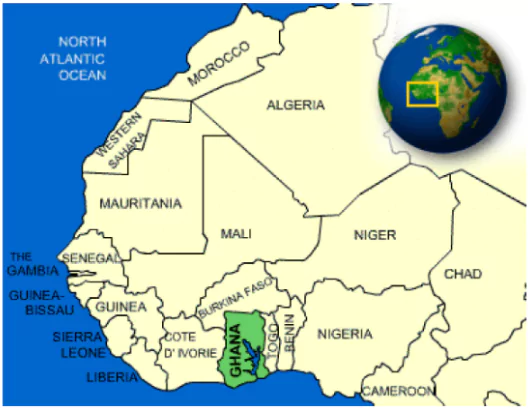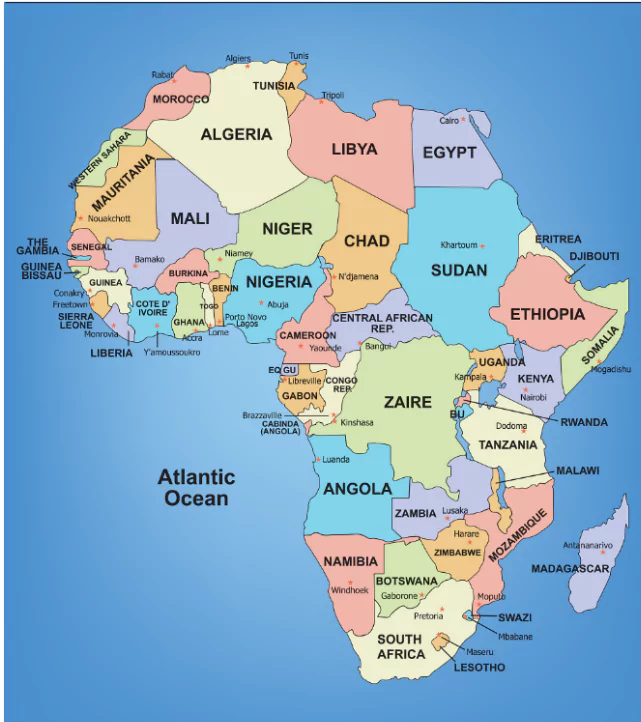Recently during addressing a special session of the Parliament in Accra, Ghana, PM Modi said India is a committed partner in the development of African nations.
About Ghana
- Location: Ghana is located in West Africa, one of the most stable democracies in Africa.
- Bordered by: Cote d’Ivoire to the west, Burkina Faso to the north, Togo to the east, and the Gulf of Guinea to the south.
- Capital: Accra
- Official Language: English
- Currency: Ghanaian Cedi (GHS)
|
Key Decisions During PM Modi’s Visit to Ghana
- Bilateral Trade and Investment
- Target to Double Trade: India and Ghana aim to double bilateral trade within the next five years.
- Indian Investments: Indian companies have invested nearly $2 billion in 900 projects across Ghana.
- India reaffirmed its support for Ghana’s economic restructuring efforts.
- Agreements Signed During the Visit
 MoU on Cultural Exchange Programme (CEP): Focus on promoting cultural understanding and exchanges in art, music, dance, literature, and heritage.
MoU on Cultural Exchange Programme (CEP): Focus on promoting cultural understanding and exchanges in art, music, dance, literature, and heritage.- MoU between Bureau of Indian Standards (BIS) & Ghana Standards Authority (GSA): Enhance cooperation in standardization, certification, and conformity assessment.
- MoU between ITAM (Ghana) & ITRA (India): Focus on education, training, and research in traditional medicine.
- MoU on Joint Commission Meeting: Institutionalize high-level dialogue to review and enhance bilateral cooperation mechanisms regularly.
- FinTech and Digital Public Infrastructure (DPI)
- UPI-Based Digital Payments: India offered to share its experience with UPI to help develop Ghana’s financial technology infrastructure.
- Collaboration in Mining: Indian companies will collaborate with Ghana in the exploration and mining of critical minerals to support industrial development and supply chain resilience.
- Defence Training and Security Cooperation:
- Increased cooperation in defence training, cybersecurity, maritime security, and defence supplies.
- Agreement to advance defence ties under the framework of “security through solidarity”.
About Global South
- The “Global South” is a term used to broadly describe countries that are often characterized as developing or less developed, primarily located in Africa, Asia, and Latin America.
- It’s a geopolitical, historical, and developmental concept, not strictly a geographical one, as some countries within the Global South, like China and India, are in the Northern Hemisphere.
|
- Counter-Terrorism Cooperation: Both countries unanimously agreed that terrorism is the enemy of humanity and committed to strengthening counter-terrorism efforts.
- Global South Solidarity: Both leaders pledged continued cooperation as part of the Global South.
- Acknowledged Ghana’s role in the Voice of Global South Summit.
- African Union’s G20 Membership: PM Modi highlighted African Union’s permanent membership in the G20 during India’s presidency.
India and Africa Relations
- Historical relations: India’s fight against decolonisation and apartheid, and consistent efforts to serve as a voice of developing countries through the Non-Aligned Movement (NAM).
- Non-Aligned Movement (NAM) was founded in 1961 with the view to advancing the interests of developing countries in the context of Cold War confrontation.
- Kampala Principles: Outlined in 2018, they serve as a guiding framework for India’s engagement with the continent.
 India Africa Forum Summit: First held in New Delhi in 2008, it marked India’s initial diplomatic efforts to seek a comprehensive partnership with the African bloc of nations as a whole.
India Africa Forum Summit: First held in New Delhi in 2008, it marked India’s initial diplomatic efforts to seek a comprehensive partnership with the African bloc of nations as a whole.- India Africa Trade: As of February 2025, India is Africa’s 4th largest trading partner, with USD 100 billion in bilateral trade.
- India’s investments in Africa have reached USD 75 billion, with a target to double by 2030.
- Africa, through the African Continental Free Trade Area (AfCFTA), is putting in place the appropriate rules of origin to assure their optimization.
- This will provide a unified continental market that Indian firms can easily access and tap into—potentially increasing the scope and level of India’s engagement with Africa.
- Infrastructure: The Asia Africa Growth Corridor (AAGC) was launched by India to enhance cooperation with African countries in partnership with Japan.
- With nearly $75 billion of investments by Indian companies, India is among the top five investors in Africa.
- Defense: India Africa Defence Dialogue (IADD) has been institutionalised to be held once every two years to explore new areas of convergence for mutual engagement.
- It includes capacity building, training, cyber security, maritime security and counter terrorism.
- The Indian army is working as a UN peacekeeper and plays a peace-building role in Africa (DRCongo, Ethiopia-Eritrea border, Sudan and other), building infrastructure and de-mining land.
- Education: ‘Study in India’ was launched to attract students from neighboring and African countries.
- India has granted 42,000 scholarships since the 2015 India Africa Forum Summit (IAFS)-III.
- The first foreign campuses of National Forensic Sciences University (NFSU) in Uganda and of IIT Mumbai were established in Tanzania.
- Health and Medical Tourism between India and Africa: India was the third-largest investor in Africa’s healthcare sector from 2010–2019, accounting for a 19 percent share.
- Made in India’ COVID-19 vaccines have been exported to 42 African countries from January 2021 to March 2023.
- India has become a top medical tourism destination, with 19.5% of African tourists visiting for medical reasons in 2020.
- Humanitarian assistance: India has provided humanitarian assistance to address food deficits, floods, and other needs.
- India sent 1,000 metric tons of rice to Malawi, 1,300 metric tons of maize to Zambia, and 1,000 metric tons of rice to Zimbabwe to help with food security.
- India also sent $1 million in flood relief assistance to Kenya, including medical aid, baby food, water purification supplies, and more.
Significance of Africa in India’s Foreign Policy
- Strategic Partnership in Global South: Africa is a key ally for India in shaping a multipolar world.
- Both support reforms in global institutions like the UN Security Council and WTO.
- India’s G20 presidency in 2023 led to the African Union’s permanent membership in G20, showing India’s strong advocacy for Africa.
- Trade and Economic Importance: Africa is rich in natural resources like oil, gas, and minerals.
- India’s trade with Africa touched $98 billion in 2022–23, making Africa a vital trading partner.
- Energy and Critical Minerals: Africa is important for India’s energy security and green transition.
- Indian companies are exploring lithium and other critical minerals in Zimbabwe, Namibia, and DRC.
- India also sources solar project partners in Africa under the International Solar Alliance.
- Security and Defence Cooperation: India supports African peace and security through UN peacekeeping missions and military training.
- India has deployed around 5,000 personnel in African missions under the UN.
- Development Assistance and Capacity Building: India offers Lines of Credit, grants, and training under programs like ITEC and e-Vidya Bharati.
- So far, India has extended $12.26 billion in credit to African nations.
- Diaspora and Cultural Ties: India has a 3 million-strong diaspora in Africa.
- They are mainly in South Africa, Mauritius, Kenya, Tanzania, and Uganda.
- They act as cultural, political, and economic bridges between the two regions.
- Counter to China’s Influence: China has made heavy investments in Africa — over $170 billion since 2000.
- India offers a different model — demand-driven, people-centric, and with fewer strings attached.
- India’s model is based on capacity building and mutual respect, not just loans and infrastructure.
Significance of Ghana for India
- Geopolitical Location: Ghana is strategically located along the Gulf of Guinea in West Africa, providing India with access to important maritime routes and key West African markets.
- Regional Stability: Ghana is one of the most politically stable countries in West Africa, with free and fair elections since 1996, making it an anchor for democratic governance in the region.
- Economic Trade and Investment: India imports gold (over 70% of total imports from Ghana) and cocoa, while exporting pharmaceuticals, machinery, and agriculture-related products.
- Defense and Security Cooperation: India and Ghana collaborate on maritime security, cybersecurity, and counter-terrorism efforts, with Ghana being an important partner in UN peacekeeping missions.
- Cultural and Educational Ties: Ghana hosts a vibrant Indian diaspora of over 15,000, and cultural exchanges like the Festival of India and International Day of Yoga strengthen people-to-people connections.
- Ghana benefits from Indian Technical and Economic Cooperation programme (ITEC) and Indian Council for Cultural Relations (ICCR) scholarships.
- Development Partnership: India has extended $450 million in concessional credits and grants for infrastructure projects, including rural electrification and the Tema-Mpakadan railway project, supporting Ghana’s economic development.
- Global South Solidarity: Both countries advocate for a stronger voice for the Global South in global governance.
- Ghana supports India’s UNSC reform and its leadership in climate change and security issues.
- Humanitarian Support: India provided COVID-19 vaccines and other humanitarian aid to Ghana, demonstrating its commitment to Ghana’s health and well-being during the pandemic.
|
Opportunities for India in Africa
- Expanding Bilateral Trade: Strengthen trade partnerships across sectors like agriculture, mining, and energy.
- Africa is a significant destination for Indian pharmaceuticals, which constitute around 18.5% of India’s exports to the region.
- Investment in Infrastructure Development: Leverage India’s expertise in infrastructure development for building roads, railways, and power projects in Africa.
- Africa requires investments of over $100 billion annually for infrastructure, presenting an untapped market for Indian companies.
- Securing Critical Minerals: Enhance access to critical minerals like lithium and cobalt, crucial for India’s renewable energy and EV goals.
- Africa holds 30% of the world’s known critical mineral reserves, and India has already initiated partnerships, such as KABIL’s lithium exploration agreements in Argentina (via African partnerships).
- Food Security and Agricultural Cooperation: Collaborate on agricultural technologies, food processing, and irrigation to address Africa’s dependence on food imports.
- Africa’s food import bill was $43 billion in 2022, while 282 million Africans are undernourished, highlighting the need for agricultural transformation.
- Renewable Energy Collaboration: Develop solar and renewable energy projects under the International Solar Alliance (ISA).
- India has pledged $2 billion for solar energy projects in Africa. Solar energy initiatives can help electrify Africa’s 600 million people currently without access to electricity.
- Digital Transformation and Start-ups: Expand India’s digital payment systems, e-governance models, and technology start-ups to Africa.
- Africa has over 1.2 billion mobile subscribers, making it an attractive market for Indian digital solutions like UPI, Aadhaar, and Co-WIN platforms.
- Strengthening Health and Pharmaceutical Ties: Increase pharmaceutical exports and support health care infrastructure development in Africa.
- Indian generics account for 20% of Africa’s pharmaceutical imports. The continent’s health care market is projected to grow to $259 billion by 2030, driven by rising demand for affordable medicines.
- Political and Strategic Alliances: Reinforce India’s diplomatic ties and support African nations in global forums like the WTO and UN.
- India was instrumental in securing the African Union’s permanent membership in the G20, demonstrating its role as a global advocate for African interests.
Challenges in India-Africa Relations
- Limited Trade Integration: Despite being Africa’s fourth-largest trading partner, India-Africa trade is only $90.5 billion (2022-23), compared to China-Africa trade, which surpassed $250 billion in 2021.
- Africa’s intra-regional trade under the African Continental Free Trade Area (AfCFTA) offers immense potential, but India’s engagement in these frameworks is limited.
- Geopolitical Rivalries: Africa has become a battleground for global powers like China and the US, competing for access to resources and markets.
- China’s Belt and Road Initiative (BRI) has financed infrastructure projects across Africa, such as railways in Kenya and Ethiopia, leaving India to play catch-up.
- Governance and Security Issues: Africa faces challenges like political instability, terrorism, and corruption, particularly in the Sahel region.
- Between 2020 and 2023, there were 9 coups in seven African countries, including Sudan, Niger, and Burkina Faso, complicating diplomatic relations.
- Limited Impact of Development Cooperation: India’s Lines of Credit (LoC) and capacity-building initiatives often lack strategic integration, limiting their impact.
- Projects like Pan-African e-Network have improved connectivity but failed to address larger systemic challenges like poverty or food insecurity.
- Healthcare and Pharmaceutical Challenges: India supplies 62% of Africa’s pharmaceutical imports, but COVID-19 exposed vulnerabilities in global supply chains.
- African nations faced significant delays in accessing vaccines and medicines due to supply chain disruptions.
- Cultural and Educational Barriers: Instances of discrimination against African students in India and complaints about the quality of education deter cultural and educational exchanges.
- While 95,000 African students study in China, India’s Study in India initiative has failed to attract significant numbers.
- Climate Change and Food Insecurity: Africa’s 282 million undernourished population (2022) and increasing climate-related disasters demand urgent attention.
- The Horn of Africa faces severe droughts, exacerbating food insecurity and forcing India to address humanitarian needs.
Way Forward for India-Africa Relations
- Boosting Economic Cooperation: Diversify trade portfolios by focusing on sectors like renewable energy, technology, and healthcare.
- Strengthening Engagement: The last India-Africa Forum Summit (IAFS) was held in 2015. India must convene IAFS-IV soon to capitalize on the African Union’s inclusion in the G-20 under India’s presidency.
- An India-African Union Track 1.5 Dialogue can help address mutual concerns, with Addis Ababa (African Union’s seat) as a potential host for IAFS-IV.
- Setting up an AU regional office in New Delhi would facilitate regular consultations.
- Enhancing Security Cooperation: Increase collaboration in counter-terrorism, maritime security, and cybersecurity.
- Addressing Food and Healthcare Needs: Partner with African nations on sustainable agriculture and boost pharmaceutical manufacturing within Africa.
- Leveraging Cultural and Educational Ties: Greater interaction between universities, think tanks, civil society and media organisations in India and select African countries is needed.
- Establish a National Centre for African Studies in India and liberalize visas for African students.
- Trilateral and Multilateral Cooperation: Foster trilateral initiatives like the India-Brazil-South Africa (IBSA) Fund to address Africa’s developmental challenges.
- Sustainable Development Initiatives: Promote renewable energy and climate action through platforms like the International Solar Alliance (ISA).
- Leveraging India’s Digital Strengths: India’s digital stack (e.g., UPI, biometrics, Jan Dhan technology) can be replicated in African nations.
- UPI and RuPay services already operate in Mauritius, with countries like Kenya, Namibia, Ghana, and Mozambique showing interest.
- Support for Industrialization and Value Addition: India must focus on creating higher value-added investments in sectors like agriculture, pharmaceuticals, and manufacturing.
- Indian companies can contribute by establishing manufacturing bases, promoting farm mechanization, food processing, and cold storage infrastructure.
Conclusion
India-Africa relations hold immense potential for fostering mutual growth, addressing global challenges, and promoting South-South cooperation. By overcoming existing challenges and focusing on strategic collaboration in trade, security, and development, both regions can build a resilient and inclusive partnership that benefits their populations and contributes to a balanced global order.
![]() 7 Jul 2025
7 Jul 2025

 MoU on Cultural Exchange Programme (CEP): Focus on promoting cultural understanding and exchanges in art, music, dance, literature, and heritage.
MoU on Cultural Exchange Programme (CEP): Focus on promoting cultural understanding and exchanges in art, music, dance, literature, and heritage. India Africa Forum Summit: First held in New Delhi in 2008, it marked India’s initial diplomatic efforts to seek a comprehensive partnership with the African bloc of nations as a whole.
India Africa Forum Summit: First held in New Delhi in 2008, it marked India’s initial diplomatic efforts to seek a comprehensive partnership with the African bloc of nations as a whole.